高考英语重点语法复习反义疑问句
高考英语反义疑问的高频考点分析

高考英语反义疑问的高频考点一、陈述句为肯定形式,附加疑问部分就用否定形式;陈述句为否定形式,附加疑问部分就用肯定形式。
二、陈述句与附加疑问句的主语必须指同一人或同一事物。
陈述句的主语如果是名词或名词词组时,附加疑问句的主语必须是对应的人称代词。
三、陈述句和附加疑问句中动词的时态和语态必须一致。
从知识点的掌握和运用着眼应把握以下方面:1. 陈述句部分是“I am + 表语”时,附加疑问句部分为:“aren’t I”2.主从复合句的附加疑问句以表达主要思想的从句为准。
主句是Ithink/suppose/consider/believe/imagine/am afraid/am sure/guess/dare say 等时,附加疑问句不能以主句为主。
如果主语是其他人称,附加疑问句部分主语仍与陈述句主语一致。
3.陈述句主语是“this,that”时,附加疑问句主语用“it”;陈述句主语是“these,those”时附加疑问句主语用“they”。
4.陈述句主语是不定式短语,动名词短语或主语从句时,附加疑问句主语用“it”。
5.陈述句部分是感叹句时附加疑问句的主语根据感叹句强调的对象选用it, they, he, she等。
6.陈述句部分含有no, nothing, none, never,scarcely,seldem, hardly, few,little 时,附加疑问句用肯定形式。
7.陈述句含有否定意义前缀或否定意义后缀的单词如:unhappy, impossible, invisible, irregular, dislike, careless等,附加疑问句主语一般用it。
8.陈述句部分主语是否 everything, anything, something, nothing 等不定代词时,附加疑问句主语一般用it。
9. 陈述句部分主语 everyone,everybody, anyone, anybody,someone, somebody, nobody 等时,附加疑问句主语一般用they。
高考英语语法——反意疑问句(共11张PPT)
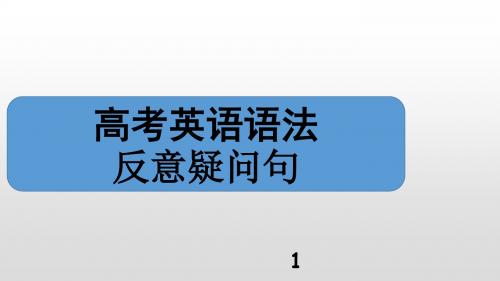
当陈述句部分含有主从复合句时,附加部分的代词和助动词 须与主句中的主谓保持一致。
You needn't do it since he has finished it, need you? It's the second time that you have sung that song, isn't it?
ome, shall we?
Let us go home, will you?
Open the door, will you?
5
need和dare既可以用作情态动词,又可以用作行为动词,所以在反意疑 问句中要准确判断其是情态动词还是行为动词。
He needn’t do it again, need he? He doesn’t need to do it again, does he? She dare say it, daren’t she? She doesn’t dare to say it, does she?
2
构成
The car is your father's, The girl doesn't sleep, The doctor can help you,
陈述句
isn't it? does she? can't he?
反意疑问句
be动词/情态动词/助动词 (not)+主语(代词)
3
前肯后否 前否后肯
He thinks that it will rain tomorrow, doesn't he? I think that it will rain tomorrow, won't it? They don't suppose that the film is moving, do they?
高考英语反义疑问句用法
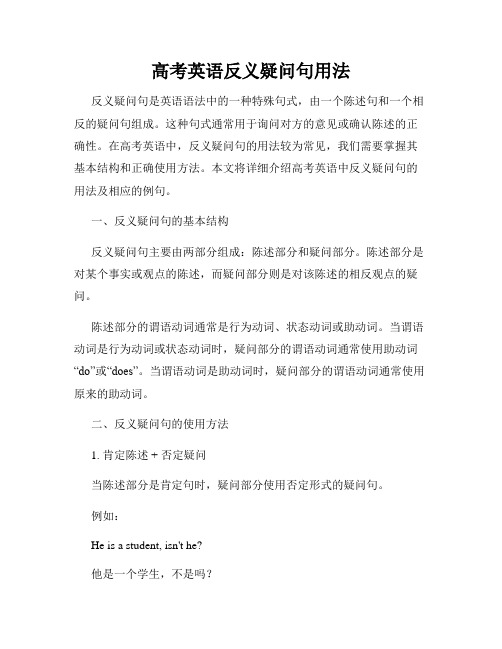
高考英语反义疑问句用法反义疑问句是英语语法中的一种特殊句式,由一个陈述句和一个相反的疑问句组成。
这种句式通常用于询问对方的意见或确认陈述的正确性。
在高考英语中,反义疑问句的用法较为常见,我们需要掌握其基本结构和正确使用方法。
本文将详细介绍高考英语中反义疑问句的用法及相应的例句。
一、反义疑问句的基本结构反义疑问句主要由两部分组成:陈述部分和疑问部分。
陈述部分是对某个事实或观点的陈述,而疑问部分则是对该陈述的相反观点的疑问。
陈述部分的谓语动词通常是行为动词、状态动词或助动词。
当谓语动词是行为动词或状态动词时,疑问部分的谓语动词通常使用助动词“do”或“does”。
当谓语动词是助动词时,疑问部分的谓语动词通常使用原来的助动词。
二、反义疑问句的使用方法1. 肯定陈述 + 否定疑问当陈述部分是肯定句时,疑问部分使用否定形式的疑问句。
例如:He is a student, isn't he?他是一个学生,不是吗?2. 否定陈述 + 肯定疑问当陈述部分是否定句时,疑问部分使用肯定形式的疑问句。
例如:She doesn't speak French, does she?她不会说法语,对吗?3. 陈述部分有实义动词如果陈述部分有实义动词(非助动词),则疑问部分使用助动词“do”或“does”。
例如:They like playing basketball, don't they?他们喜欢打篮球,对吗?4. 陈述部分有助动词如果陈述部分有助动词,则疑问部分使用原来的助动词。
例如:You can swim, can't you?你会游泳,对吗?5. 以let's开头的陈述句以let's开头的陈述句,疑问部分使用shall we。
例如:Let's go to the park, shall we?我们去公园吧,好吗?三、高考英语中的应用示例1. 完成句子The weather is nice today, ________?天气今天不错,是吗?2. 完成句子Tom isn't coming to the party, ________?汤姆不来参加聚会,是吗?3. 完成句子She will never forget this experience, ________?她永远不会忘记这个经历,对吗?4. 完成句子They have already finished their homework, ________?他们已经完成作业了,是吗?5. 完成句子Let's study harder for the exam, ________?让我们更努力地为考试学习,好吗?总结:反义疑问句是高考英语中的常见语法现象,掌握好其基本结构和正确使用方法对于理解和运用该句式非常重要。
高中英语知识点归纳反义疑问句的用法

高中英语知识点归纳反义疑问句的用法反义疑问句是英语语法中的重要一部分,通过简短的附加疑问句,可以就前面句子的肯定或否定加以验证或表示对听话者的请求等。
掌握反义疑问句的用法对于高中英语学习来说是至关重要的。
本文将对反义疑问句的用法做一个归纳总结。
一、定义反义疑问句是由一个陈述句和一个简短的疑问句组成,一般由肯定和否定两种形式。
陈述句部分后面的附加疑问句由一个助动词和一个主语构成,其形式与陈述句前面的情态动词或助动词的否定形式相对应。
二、用法1. 如果主句是肯定陈述,附加疑问句部分一般使用否定形式。
例如:- You are a student, aren't you?- He plays basketball, doesn't he?2. 如果主句是否定陈述,附加疑问句部分一般使用肯定形式。
例如:- You don't like coffee, do you?- She hasn't finished her homework, has she?3. 如果主句是祈使句,附加疑问句部分使用will you。
例如:- Please pass me the salt, will you?- Let's go for a walk, will you?4. 如果主句是陈述句的一部分或修饰语从句,整个句子都使用附加疑问句的形式。
例如:- I know he is busy, doesn't he?- It seems that she doesn't like him, does she?三、特殊用法1. 在以Let us或Let's开头的句子中,附加疑问句部分使用shall we。
例如:- Let's go, shall we?2. 在带有never的陈述句中,附加疑问句使用ever。
例如:- He has never been to Paris, has he?3. 反义疑问句有时候用来征求对方的意见、请求等。
高考英语 几种特殊的反义疑问句总结

高考英语几种特殊的反义疑问句总结1.祈使句。
祈使句后一般加上will you或won't you构成反意疑问句,用will you 多表示“请求”,用won't you 多表示提醒对方注意。
例如:Look at the blackboard, will you/ won't you?Let引导的祈使句有两种情况:1) Let's...,后的反意疑问句用shall we或shan't we。
例如:Let's go home, shall we/ shan't we?还可以用may I来表示征求对方的同意或许可。
2)Let us/me...后的反意疑问句用will you或won't you。
例如:Let me have a try, will you/won't you?2.感叹句。
感叹句后加反意疑问句时,其反意疑问句需用be的一般现在时态的否定形式。
例如:What fine weather, isn't it?3. 当陈述部分谓语动词是need, dare, 且这些词被用作实义动词时,其反意疑问句需用do的适当形式。
例如:He needs help, doesn't he?4.陈述部分主、谓语是I am...时,反意疑问句用aren't I 或ain't I ,而不是am notI (可用am I not)。
例如:I'm working now, ain't I?5.陈述部分的主语是everything, nothing, anything或something 时,反意疑问句的主语应用代词it。
例如:Something is wrong with my radio, isn't it?6.陈述部分的主语是everybody, everyone, anybody, anyone, somebody, someone, nobody, no one, none, neither 时, 其反意疑问句的主语需用复数代词they。
高考英语总复习之反义疑问句

You must have heard about it, haven’t you?
You must have watched the football match last night, didn’t you?
高考英语总复习之反义疑问句(共28 页PPT )ppt课 件完美 课件优 秀课件 公开课 课件
高考英语总复习之反义疑问句(共28 页PPT )ppt课 件完美 课件优 秀课件 公开课 课件 高考英语总复习之反义疑问句(共28 页PPT )ppt课 件完美 课件优 秀课件 公开课 课件
行为动词 :do 7. need
情态动词: need
don’t we
need we
高考英语总复习之反义疑问句(共28 页PPT )ppt课 件完美 课件优 秀课件 公开课 课件
6. must
must:必须needn’t
They must come on time, _n_e_e_d_n_’_t _th_e_y__? mustn't 禁止
You mustn’t smoke here, must/may you?
must:猜测,一定,想必
根据must 后的动词时态来确定
That man must be Mr. Zhang, isn’t he?
前否后肯
never, seldom, hardly, few, rarely, scarcely, little, nothing, nobody, too...to
2. un-, im-, in-, dis- —— 含有否定前缀的词不属于 否定词。
Your father is unhappy, __i_s_n_'t_h_e___? The man is dishonest, _i_s_n_'t_h_e____? It is impossible to learn English without remembering more words, _i_s_n_'t_i_t__?
高考英语重点语法复习反义疑问句

反义疑问句反义疑问句The Disjunctive Question又叫附加疑问句Tag Question;在口语中,反义疑问句用于发起谈话、询问信息或是礼貌的请求别人去做某件事;反义疑问句由两部分组成:前一部分是一个陈述句,后一部分是一个简短的疑问句,两部分的人称时态应保持一致;总体规则一、反义疑问句的语调1、在说话人知道问题的答案,使用反义疑问句表示请求赞同时,后面的反义疑问句部分用降调; That film was fantastic, wasn't it ↘2、在说话人不明确问题的答案,使用反义疑问句表示说话人需要核实信息时,后面的反义疑问句部分用升调;You don't know where the boss is, do you ↗二、反意疑问句中的对应规则:1、反意疑问句中问句部分的谓语动词与陈述部分的谓语动词在语气上成相反的对应关系,即:肯定+否定否定+肯定①You can’t do it, can you②They are very late for the meeting, aren’t they2、反意疑问句中问句部分的动词与陈述部分的动词种类要对应一致;如:①He has supper at home every day, doesn’t he 不能用hasn’t he②They have known the matter, haven’t they 不能用don’t they3、反意疑问句中问句部分的动词在时态上应和陈述部分的时态一致;如:①They will go to town soon, won’t they 不能用don’t they或aren’t they②He works very hard, doesn’t he 不能用didn’t he或won’t he注:当陈述部分是I think 加从句时,疑问句应和从句的人称时态保持一致;I think chickens can swim, can’t theyI think Lucy is a good girl, isn’t sheI didn't think he was happy, was he三、反义疑问句中主语变化规则4、陈述部分的主语是everybody, everyone, someone, no one, nobody, somebody 等合成词或词组时,反意疑问句部分的主语在非正式文体中,往往用they,有时也用he;而当陈述部分的主语是指示代词或不定代词this, that, everything, nothing, something等时,反意疑问句部分的主语用it;①Everyone is ready for the experiment, aren’t they isn’t he② Neither side can win, can they can he5、当陈述部分以one不定代词做主语时,附加问句的主语在正式常场用one或you,非正式场合用he;One should always be ready to help those in trouble, shouldn’t one/you 每个人都应该随时准备帮助那些有困难的人,是吗One must serve the people heart and soul, mustn't he 每个人都必须要全心全意为人们服务,不应该吗6、当陈述部分的主语是不定式、动名词、从句、this或that,反义疑问句的主语用it;是those, these则用they① To learn English well is quite bene ficial to our future, isn’t it② Developing a good habit is very important for us students to learn our lessons well, isn’t it③That he doesn’t work very hard makes his parents worried, doesn’t it④This is important, isn’t it⑤That isn’t correct, is it⑥These are your friends Tom and Jack, aren’t they7、当陈述部分的主语是表示物的不定代词everything, anything, nothing等,反义疑问句的主语用 it;Something is wrong with your notebook, isn’t it 你的笔记本电脑坏了,是吗8、陈述部分的主语是none of…时,反义疑问句部分的主语应与of后的名词或代词保持一致;① None of the students went there, did they② None of the dish smells good, does it四、反义疑问句部分肯定和否定形式的判断规则9、陈述部分带有否定词或半否定词,例如:barely, few, little, never, hardly, scarcely, seldom, no, none, no one, rarely, nowhere, nothing, nobody, few, little等,反义疑问句的动词要用肯定形式;① There are few apples in the basket, are there② He can hardly swim, can he③ They seldom come late, do they10、如果陈述部分中的否定词仅带有否定的前缀或后缀,此类词不属于否定词,那么该陈述句应作肯定句处理,反义疑问句应用否定形式;① Your father is unhappy, isn’t he不能用is he②The man is dishonest, isn’t he 不能用is he③It is impossible to learn English without remembering more words, isn’t it不能用is it常见句型的反意疑问句11、当陈述部分是there be 存在句型时,反义疑问句的主语也用there;①There’s no help for it, is there②There’s something wrong, isn’t there12、感叹句的反义疑问句,其谓语要求用否定句;①What a clever boy, isn’t he②How exciting the game is, isn’t it13、祈使句后面的反义疑问句问题1 祈使句是否定形式,反义疑问句只能用will you;Let us stop to rest, will you2 祈使句是肯定形式,反义疑问句用肯定、否定均可;Give me some cigarettes, will you/ won’t you3 Let开头的祈使句要注意:1. Let’s 在意义上包含谈话的对方在内,表示提出建议或征求对方意见,其反意疑问句往往用shall we;Let’s have a basketball match this afternoon, shall we 2. Let us在意义上一般不包含谈话的对方在内,表示请求对方允许做某事的含义,let 有allow的意思;附加疑问部分用will you;Let us go out for a rest, will you3. Let me开头表示请求,反义疑问句用will you,或用may I;Let me have a try, will you/may I复合句的反意疑问句14、当陈述部分是一个带that引导宾语从句的主从复合句时,反义疑问句的主谓要和主句的主谓保持对应关系;但是,当陈述部分的主语是:I suppose, I think, I believe, I imagine, I expect 等结构时,反义疑问句的主语和谓语要和从句的主语,谓语保持一致关系;而且要注意到否定的转移问题;①I don’t think that you can do it, can you 不用do I②We don’t believe that the news is true, is it 不用do we③I don’t think that you can do it, can you 不用do I④We don’t believe that the news is true, is it不用do we15、当陈述部分是I’m sure that,;we are sure;I’m afraid that;We are sure that;I feel sure that 等后面跟宾语从句时,反意疑问句与后面的宾语从句一致;①I’m sure that you will succeed in passing the exam, won’t you②I’m afraid that John can’t go now, can he16、当陈述部分是并列句时,反义疑问句的主谓语要和离它最近的句子的主谓保持对应关系; Xiao Lin has been writing letters all afternoon but he should finish them now, shouldn’t he17、强调句或类似的句型结构的反义疑问句和句首的It is/ was保持一致;①It was last Sunday that he went to Beijing, wasn’t it②It is five years since he joined the army, isn’t it关于情态动词的反意疑问句18、陈述部分中有have一词,且表示“所有”含义时,反义疑问句部分既可用have也可用do; They have no time to visit the museum, do they19、陈述部分中有have to,反义疑问句部分用do;I had to finish my homework, didn’t I20、含有ought to 的反意疑问句,陈述部分是肯定的,疑问部分用shouldn't/oughtn't +主语; He ought to know what to do, oughtn't he / shouldn't he21、陈述部分有used to,反义疑问句部分可用used 也可以用did;①The old man used to smoke, didn’t he或usedn’t he②Tom used to live here, usedn’t he 或didn’t he22、带情态动词dare或need的反意疑问句,疑问部分常用 need dare +主语;① We need not do it again, need we② He dare not say so, dare you注:当dare, need 为实义动词时,疑问部分用助动词do + 主语;She doesn't dare to go home alone, does she23、陈述部分有wish时,反义疑问句的谓语用may,前后两部分都用肯定式;I wish not to be disturbed in my work , may I24、当陈述部分有情态动词must,问句有4种情况:1. mustn't表示“禁止,不可,不必”时,附加问句通常要用must/may.You mustn't stop your car here, must/may you2. must表示“有必要”时,附加问句通常要用needn't.They must finish the work today, needn't they3. 当must用来表示对现在的情况进行推测时,问句通常要根据must后面的动词采用相应的形式;① He must be good at English, isn't he②He must have finished his homework, hasn’t he4. 当must+have done表示对过去的情况进行推测一般句中有明确的过去时间状语,问句要根据陈述部分谓语的情况用“didn't+主语”或“wasn't/weren't+主语”;如果强调动作的完成一般没有明确的过去时间状语,问句要用“haven't/hasn't+主语”;① She must have read the novel last week, didn't she② You must have told her about it, haven't you25、陈述部分是I wish, 表示询问或征求意见,附加疑问部分用may I;I wish to have a word with you, may I26、弄清陈述句中的’d rather = would rather;’d better = had better反义疑问句部分前者用would,后者用had;① He would rather read it ten times than recite it, wouldn't he②You’d better get up early, hadn’t you注:其它特殊结构的反意疑问句27、陈述部分的主语是each of 时,如果强调单个,反义疑问句的主语用he或it;如果强调全体,则根据情况用they,we,you等;①Each of the boys had an apple, didn’t he/they②Each of the books costs us five yuan, didn’t we28、陈述部分的主语是由neither…nor……,either….or…..或not only……but…also等连接的并列的主语保持时,反义疑问句的主语常用相应的复数部分,而不与nor, or,but also 之后的主语主语保持一致;① Neither you nor I am wrong, are we② Either you or I am right, are we③Not only Tom but also Alice likes skating, don’t they29、陈述部分是:I’m ....结构,反义疑问句一般用aren’t II'm very keen on sports , aren’t I30、陈述部分有You'd like to +v. 疑问部分用wouldn't +主语;You'd like to go with me, wouldn't you。
高考干货之“反义疑问句”高考英语精讲——语法(十一)
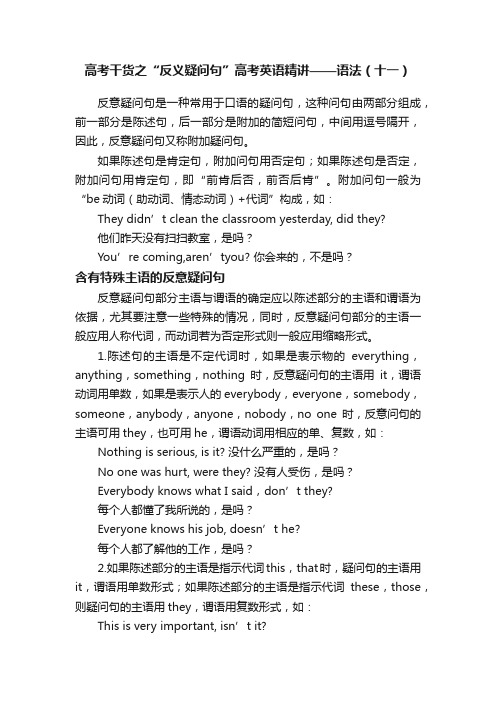
高考干货之“反义疑问句”高考英语精讲——语法(十一)反意疑问句是一种常用于口语的疑问句,这种问句由两部分组成,前一部分是陈述句,后一部分是附加的简短问句,中间用逗号隔开,因此,反意疑问句又称附加疑问句。
如果陈述句是肯定句,附加问句用否定句;如果陈述句是否定,附加问句用肯定句,即“前肯后否,前否后肯”。
附加问句一般为“be动词(助动词、情态动词)+代词”构成,如:They didn’t clean the classroom yesterday, did they?他们昨天没有扫扫教室,是吗?You’re coming,aren’tyou? 你会来的,不是吗?含有特殊主语的反意疑问句反意疑问句部分主语与谓语的确定应以陈述部分的主语和谓语为依据,尤其要注意一些特殊的情况,同时,反意疑问句部分的主语一般应用人称代词,而动词若为否定形式则一般应用缩略形式。
1.陈述句的主语是不定代词时,如果是表示物的everything,anything,something,nothing时,反意疑问句的主语用it,谓语动词用单数,如果是表示人的everybody,everyone,somebody,someone,anybody,anyone,nobody,no one时,反意问句的主语可用they,也可用he,谓语动词用相应的单、复数,如:Nothing is serious, is it? 没什么严重的,是吗?No one was hurt, were they? 没有人受伤,是吗?Everybody knows what I said,don’t they?每个人都懂了我所说的,是吗?Everyone knows his job, doesn’t he?每个人都了解他的工作,是吗?2.如果陈述部分的主语是指示代词this,that时,疑问句的主语用it,谓语用单数形式;如果陈述部分的主语是指示代词these,those,则疑问句的主语用they,谓语用复数形式,如:This is very important, isn’t it?这是非常重要的,是吗?These are cups, aren’t they?这些是茶杯,是吗?3. 陈述部分的主语是从句、不定式或动名词时,疑问部分的主语用it,谓语用单数,如:What you said is wrong, isn’t it?你说的错了,不是吗?To learn English well isn’t easy, is it?学好英语不容易,是吗?Practising speaking English every morning will do you good, won’t it?每天早上练习说英语对你有好处,不是吗?含有特殊动词的反意疑问句1.如果陈述句中有系动词或情态动词或助动词,附加疑问句中用与它相应的肯定或否定形式即可;如果没有,就要根据陈述句的时态选择适当的助动词,如:Tom has finished his homework, hasn’t he?汤姆己经完成了他的家庭作业,是吗?She went to Shanghai yesterday, didn’t she?她昨天去上海了,是吗?2. 陈述句是I am…结构,反意问句用aren’t I 或am not I,如:I’m right, aren’t I?我是正确的,对吗?I’m late, a m not I?我迟到了,是吗?3.陈述句中的谓语动词是there be,后边的疑问部分也用there be形式,如:There is an apple on the table, isn’t there?桌子上有只苹果,是吗?There’re some trees on the island, aren’t there?小岛上有一些树,是吗?4.陈述句中的谓语动词为have/has to/had to时,其疑问部分的谓语动词应用don’t /doesn’t/didn’t,如:He has to get up at four tomorrow, doesn’t he?他明天不得不4点钟起床,是吗?They had to leave early, didn’t they?他们不得不早些离开,是吗?5.当陈述部分有dare或need时,若dare和need为实义动词,疑问部分的谓语动词用do的适当形式;若dare和need为情态动词,疑问部分用dare或need构成,如:We need to do it, don’t we?我们需要做这种事,是吗?You daren’t go there, dare you?你不敢去那里,是吗?6. 含有情态动词must的句子1). 若陈述句中强调对现在的情况的推测,疑问部分用aren’t/isn’t+主语,如:You must be tired, aren’t you?你一定很累了吧,对吗?2).陈述句中谓语动词是must have+过去分词时,若陈述句中强调过去情况的推测(一般有过去时间状语),疑问部分的谓语动词用didn’t +主语,如:He must have met her yesterday, didn’t he?他想必是昨天下午见过她了,是吗?3). 若陈述句中强调动作的完成,疑问部分的谓语动词用haven’t/hasn’t+主语,如:You must have seen the film, haven’t you?你想必是看过这部电影,是吗?4). 若陈述部分的must表示“有必要”时,附加疑问句的部分则用needn’t,如:You must go home right now, needn’t you?你有必要马上回家,是吗?5). 当mustn’t表示禁止时,附加疑问部分一般用may,如:You mustn’t walk on grass, may you?不许在草地上走,知道吗?特殊句式中的反意疑问句1.陈述句句中有hardly,seldom,rarely,no,nothing,never,little,few,nobody,nowhere,barely,neither,too…to等表示否定意义的词时,反意问句用肯定形式,如:You will never forget it, will you?你永远不会忘记这件事,是吗?There is nothing on the table, is there?桌子上什么也没有,是吗?She has few friends, does she?她几乎没有朋友,是吗?2. 祈使句的反意疑问句,一般在句尾加will you,如:Give me a hand, will you? 帮帮我,好吗?Stop that noise, will you? 别吵了,行不行?Don’t forget it, will you? 别忘了它,好吗?Don’t talk any more, will you? 别再说话了,好吗?3. let’s开头的祈使句的反意疑问句用shall we;let us开头的祈使句的反意疑问句用will you,如:Let’s go there, shall we?Let us go there, will you?我们去那里,好吗?4. 主从复合句的附加问句1). 复合句的反意疑问句一般是根据主句的主语和谓语形式构成反意疑问部分的,如:He said that we were happy, didn’t he?他说那时我们很开心,没说过吗?2).复合句的主句是I think(expect,suppose,believe,suspect,imagine)时,附加问句要根据主句而定,主语是第一人称时,要根据从句而定,主语为第二、三人称时,与主句保持一致,并且要注意否定的转移,如:I suppose he is serious, isn’t he?我想他很严肃,是吗?I don’t think he is the suitable man for the job, is he?我认为他不是做那项工作的合适人选,不是吗?You think she is a good teacher, don’t you?你认为她是一个好老师,是吗?Your brother thinks you can do the job well, doesn’t he?你弟弟认为你能把这项工作做好,不是吗?5. 并列复句的反意疑问句这种反意疑问句,其疑问部分一般与最接近的分句的主、谓语保持一致,如:We must start at once or we can’t get there on time, can we?我们必须马上出发,否则我们将不能按时到达那里了,对吗?He is a teacher but his wife isn’t a teacher, is she?他是老师,他妻子不是,对么?易错点:1. 陈述句谓语动词是wish,表示征求意见时,反意问句用may,如:I wish to have another piece of cake, may I?我想再要一块蛋糕,可以吗?I wish to go home now, may I?我想现在就回家,可以吗?2. 反意疑问句的答语1). 反意疑问句的答语一般由yes或no引导的简略答语来回答,但是要注意时态及代词的呼应,如:---She is your teacher, isn’t she? 她是你的老师,是吧?---Yes, she is. 是的,她是。
高考英语 高频语法串讲 反义疑问句

高考英语语法专讲:反义疑问句一.概念反意疑问句是附加在陈述句之后,对陈述句所表示的事实或观点提出疑问的句子.附加疑问实际上是一种简略的一般疑问句.二.相关知识点精讲1.反意疑问句的结构:陈述句(主语+谓语……),+助动词/情态动词/be动词+主语(代词形式)?说明:陈述句部分如果是肯定句,反意疑问句,疑问句部分的助动词/情态动词/be动词+not (否定提问);如果陈述句部分是否定句,反意疑问句,疑问句部分用肯定式提问。
例句:He is your teacher, isn’t he?People shouldn’t drop litter on the pavements, should they?You foun d the key in the bedroom, didn’t you?They have a house in town, haven’t they? /don’t they?The boy has to clean his room, doesn’t he?I am right, aren’t I?They’d rather go by bus, wouldn’t they?You’d better change your wet skirt, hadn’t you?He’d like to join our discussion, wouldn’t he?She ought to see a doctor at once, shouldn’t she? / oughtn’t she?I wish to s ay a few words, may I?That’s nice, isn’t it?This i s the place, isn’t it?Everybody knows the answer, don’t they?Nothing is serious, isn’t it?T here wasn’t enough time at that moment, was there?There used to a tower here, usedn’t there? / didn’t there?What you need is more practice, isn’t it?2.某些特殊句型的反意疑问句:1)祈使句的反意疑问句:表示肯定意义的祈使句,即表示“请求,提示”它的反意疑问句用will you 表达:有时也可以用won’t you 表示。
高中英语复习 反义疑问句 (共27张PPT)

4. 完成时的反意疑问句
主语+have/has+过去分词…, haven’t (hasn’t) + 主语? He has been to America, hasn’t he ? Marry hasn’t lived in the countryside, has she ? You haven’t been to Shanghai, have you ?
简单句的反义疑问句
1.含有be动词(is, are, was, were)的句型: 现在: 主语+is (are)…, isn’t (aren’t) + 主语? 过去: 主语+was (were)…,wasn’t (weren’t) + 主语? are you You are not students, _______? The students are going to have a picnic,_______________ aren’t they ? were they ? The Greens weren’t at home last night, ______________
反意疑问句的解答步骤
1. 判定(判断该用肯定还是否定); 2. 找动(确定句子的助动词类型或情态动词:be、do 和完成have的适当形式以及情态动词的形式); 3. 换代(将主语换为代词);
Jack wasn’t playing soccer, ____ was ___? he Their parents have gone to London, haven’t they ___________? have I___? I have never been to the park, ____ don’t you You have a good friend, ______ ____? didn’t ____? we We had a meeting, _____
高中英语知识点归纳反义疑问句的特殊用法
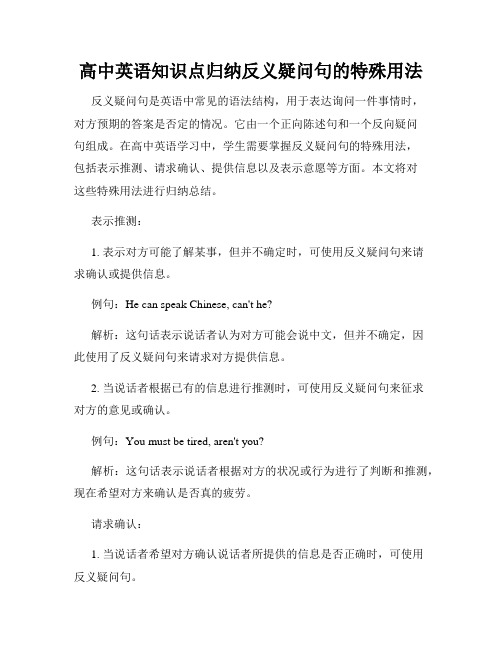
高中英语知识点归纳反义疑问句的特殊用法反义疑问句是英语中常见的语法结构,用于表达询问一件事情时,对方预期的答案是否定的情况。
它由一个正向陈述句和一个反向疑问句组成。
在高中英语学习中,学生需要掌握反义疑问句的特殊用法,包括表示推测、请求确认、提供信息以及表示意愿等方面。
本文将对这些特殊用法进行归纳总结。
表示推测:1. 表示对方可能了解某事,但并不确定时,可使用反义疑问句来请求确认或提供信息。
例句:He can speak Chinese, can't he?解析:这句话表示说话者认为对方可能会说中文,但并不确定,因此使用了反义疑问句来请求对方提供信息。
2. 当说话者根据已有的信息进行推测时,可使用反义疑问句来征求对方的意见或确认。
例句:You must be tired, aren't you?解析:这句话表示说话者根据对方的状况或行为进行了判断和推测,现在希望对方来确认是否真的疲劳。
请求确认:1. 当说话者希望对方确认说话者所提供的信息是否正确时,可使用反义疑问句。
例句:You understand, don't you?解析:这句话表示说话者希望对方确认自己所说的内容是否被理解。
2. 当说话者希望对方重复确认某个问题时,也可以使用反义疑问句。
例句:You are coming to the party, aren't you?解析:这句话表示说话者希望对方确认是否会参加派对,并希望得到对方的回答。
提供信息:1. 当说话者希望提供某个事实或消息,并希望对方确认或接受时,可使用反义疑问句。
例句:The concert is at 8 o'clock, isn't it?解析:这句话表示说话者希望对方确认音乐会的时间,并期待对方肯定地接受。
2. 当说话者希望提供有关自己或他人的信息,并期待对方提出问题时,也可以使用反义疑问句。
例句:She is from France, isn't she?解析:这句话表示说话者提供了有关某人的国籍信息,并期待对方针对这个信息提出问题,比如询问她会不会说法语等。
2022年高考英语备考之语法反义疑问句与倒装句详解

语法:反义疑问句与倒装句详解反意疑问句和倒装句一、反意疑问句(disjunctive questions/ tag questions)1.前一句是肯定句,后面要用否定问句;前面是否定句,包括句子里带有否定意义的词如never, seldom, hardly, scarcely, rarely, few, little, no, nothing, none 等,后面要用肯定问句。
eg. He has made few friends in his class, has he?You seldom meet with this kind of matter, do you?She said nothing at the meeting, did she?但是要注意,impossible, dissatisfy, uncomfortable这类词不是否定词。
eg. He is impossible to finish the work by himself, isn’t he?The result of the maths exam dissatisfied yo u, didn’t it?You failed to pass the test, didn’t you?2.前后的人称要一致,但后面的问句中只能用代词,不能用名词。
如果前面的主语是everything, anything, something,nothing那么在问句中用it作主语;如果前面是everyone, everybody, no one, nobody, someone, somebody, anyone, anybody, those, all(指人)等词作主语,那么后面问句可以用he或者they作主语,现在用they 更加普遍。
eg. Everything is ready, isn’t it?Nothing can prevent him from working, can it?Everyone in the village knew the man, didn’t they/ he?如果是there be的句型,那么后面的问句就用引导词there。
高考英语反义疑问句句型归纳

反义疑问句句型归纳1、You had no time for reading, did you ? / had you?2、He has a brother, hasn’t he, / doesn’t he?3、We have to go without him, don’t we ?4、You have your dinner at school, don’t you?5、He has a rest every two hours, doesn’t he?6、This is your last chance to learn from the beginning, isn’t it?7、Those were terrible days for us to recall, weren’t they?8、There are some books you are interested in, aren’t there?9、Let us do it as we please / like to, will you? / can you?10、Let’s us do it right now, shall we? / can we?11、Come here, will you? / won’t you / can you / can’t you / do you / don’t you?12、Don’t say anything, will you? / can you? / do you?13、Tom, you clean the window, will you?14、I think / say /suppose / guess / am sure he will come back soon, won’t he?15、I don’t think he will come back , will he?16、He old man never thought he was lonely, did he?17、The old man used to be a farmer, usedn’t he / didn’t he?18、He ought to come, oughtn’t he / shouldn’t?19、He seldom goes to the cinema, doesn’t he?( hardly, never, few, little, nothing, nobody)20、It’s unfair, isn’t it?21、One can’t be careful enough, can one / can he?22、Everything goes well, doesn’t it?23、Everybody agrees with him, doesn’t he / don’t they?24、All we needed has been bought, hasn’t it?25、All we invited have arrived, haven’t they?(All refers to people)26、Learning English is very hard, isn’t it?27、He studies hard and he is often praised by his teachers, isn’t he?28、We must be more polite in this occasion, needn’t we?29、He must be a brave man, isn’t he?30、It must have rained last night, didn’t it?31、He mush have known the answer, hasn’t he?32、He can’t have done such a foolish thing, has he?33、I am a student, aren’t I ?34、So he has known the secret, has he?35、Oh, you have the same type of sell phone as I, do you?。
2023届高考英语语法:疑问代词用法综述及反意疑问句学习要点讲义

2023年高中英语语法:疑问代词用法综述及反意疑问句学习要点英语疑问代词用法综述一、疑问代词的作用疑问词的作用主要是用于引出特殊疑问句。
其中疑问词在句中可用作主语、宾语、表语或定语等。
英语疑问句的词序通常为“疑问词+一般疑问句”。
如:What did you do with the money that was leaf? 你对剩下的钱是怎么处理的?但若疑问词直接用作主语或修饰语语,则其词序为“疑问词+谓语+其他成分”。
如:What made you so frightened? 什么使你这样惊恐?Who will attend on the patient? 谁来护理病人?Which car was your original choice?你原来选的是哪辆车?二、指人的疑问代词指人的疑问代词主要有who,whom,whose。
其中who为主格,whom 为宾语,whose为所有格。
如:Who is responsible for breaking the mirror?是谁把镜子打破的?Whom would you suggest for the job? 你提议由谁来做这工作?Whose turn is it to treat next? 下次该谁请客?三、指物的疑问代词指物的疑问代词主要有what,它在句中可用作主语、宾语和定语等。
如:What is the total population of china? 中国的人口总数是多少 ?What can I do in return for your kindness?我怎样做才能报答你的好意呢?What things happened after we left? 我们离开后发生了什么事?四、既可指人也可指物的疑问代词既可用来指人又可用来指物的疑问代词主要有which,它在句中可用作主语、宾语和定语。
如:Which doctor is attending you? 哪个医生在给你治疗?Which judge is hearing the case? 哪个法官在审这个案子?Which part of the concert did you like best [most]? 这场音乐会,哪一部分你最喜欢?Which subjects are compulsory in your schoo1?在你们学校里,哪些课程是必修的?Which events is he going in for at the Olympics? 他参加奥运会的什么项目?英语反意疑问句学习要点1.反意疑问句的结构特点反意疑问句的基本结构为:陈述句+简略的一般问句。
高考英语总复习 反意疑问句用法

反意疑问句用法总复习反意疑问句是中学英语教学的重点难点之一,也是高考热点之一。
为此,我整理31条今天在这里整理归纳做出以下讲解。
第一部分误正辨析1、请让我们回家吧,好吗?误:Let us go home,shall we?正:Let us go home,will you?正:Let us go home,won't you?【简析】let us(不缩写)的us不包括对方在内,表示“请求”时,附加疑问句应用will you,有时也可以用won't you。
2、咱们现在回家吧?误:Let's go home now,will you?正:Let's go home now,shall we?【简析】let's包括对方,即“咱们”,表示“建议”时,附加疑问句应用shall we。
3、他上午很少回家,是不是?误:He seldom goes home in the morning,doesn't he?正:He seldom goes home in the morning,does he?【简析】在陈述部分中有never,hardly,few,little,scarcely,seldom等在句中起否定作用,反意疑问句中通常要用肯定结构。
4、多么好的孩子,是吗?误:What a good boy,is he?正:What a good boy,isn't he?【简析】感叹句都是肯定的,其反意问句要用否定式。
5、请回到你的座位上去,好吗?误:Go back to your seat,don't you?正:Go back to your seat,will you?正:Go back to your seat,won't you?【简析】陈述部分为第二人称祈使句,其后的反意疑问句用will you或won't you。
前者比后者更普通。
高中英语反义疑问句用法归纳
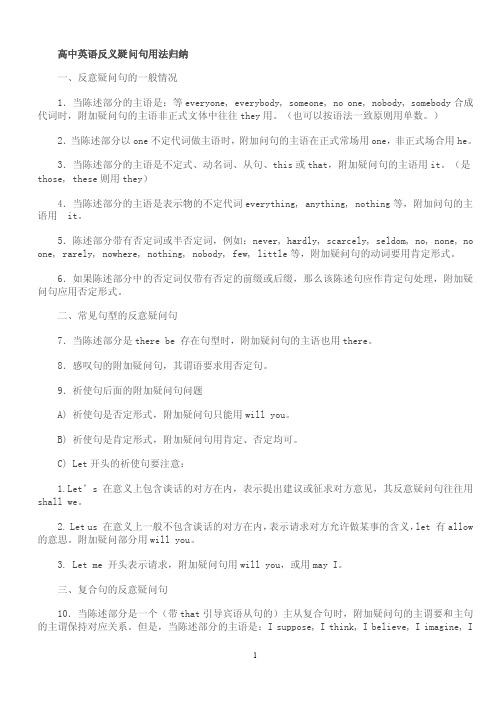
高中英语反义疑问句用法归纳一、反意疑问句的一般情况1.当陈述部分的主语是:等everyone, everybody, someone, no one, nobody, somebody合成代词时,附加疑问句的主语非正式文体中往往they用。
(也可以按语法一致原则用单数。
)2.当陈述部分以one不定代词做主语时,附加问句的主语在正式常场用one,非正式场合用he。
3.当陈述部分的主语是不定式、动名词、从句、this或that,附加疑问句的主语用it。
(是those, these则用they)4.当陈述部分的主语是表示物的不定代词everything, anything, nothing等,附加问句的主语用it。
5.陈述部分带有否定词或半否定词,例如:never, hardly, scarcely, seldom, no, none, no one, rarely, nowhere, nothing, nobody, few, little等,附加疑问句的动词要用肯定形式。
6.如果陈述部分中的否定词仅带有否定的前缀或后缀,那么该陈述句应作肯定句处理,附加疑问句应用否定形式。
二、常见句型的反意疑问句7.当陈述部分是there be 存在句型时,附加疑问句的主语也用there。
8.感叹句的附加疑问句,其谓语要求用否定句。
9.祈使句后面的附加疑问句问题A) 祈使句是否定形式,附加疑问句只能用will you。
B) 祈使句是肯定形式,附加疑问句用肯定、否定均可。
C) Let开头的祈使句要注意:1.Let’s 在意义上包含谈话的对方在内,表示提出建议或征求对方意见,其反意疑问句往往用shall we。
2. Let us 在意义上一般不包含谈话的对方在内,表示请求对方允许做某事的含义,let 有allow 的意思。
附加疑问部分用will you。
3. Let me 开头表示请求,附加疑问句用will you,或用may I。
高考英语语法复习反义疑问句课件

• Eg:She must be looking forward to your return,___?
• A.mustn’t she B.wasn’t she C.isn’t she D.didn’t she
•C
• 三、主从复合句中和主句保持一致。但如 果
• 1.主句的主语为一人称I或we。
The Swede made no answer, did he / she? Some plants never blown (开花), do they ?
• 4) 含有ought to 的反意疑问句,陈述部分是肯定 的,疑问部分用shouldn't / oughtn't +主语。
He ought to know what to do, oughtn't he? / shouldn't he? • 5) 陈述部分有have to +v. (had to + v.),疑问部分 常用don't +主语(didn't +主语)。
二、情态动词
Must do
must
Must have done (包 括其 它情 态动 词)
必须
前肯后 否
前否后 肯
Needn’t /mustn’t +主语
Must+ 主语
肯定(表推测,包 与must后的动词 括其它情态动词) 一致
无表过去的时间状 Have not/has
语
not+主语
didn't/
• I don’t think he should go out,( )? • Should he • I didn’t think he should go out,( )? • Did I
- 1、下载文档前请自行甄别文档内容的完整性,平台不提供额外的编辑、内容补充、找答案等附加服务。
- 2、"仅部分预览"的文档,不可在线预览部分如存在完整性等问题,可反馈申请退款(可完整预览的文档不适用该条件!)。
- 3、如文档侵犯您的权益,请联系客服反馈,我们会尽快为您处理(人工客服工作时间:9:00-18:30)。
反义疑问句反义疑问句(The Disjunctive Question)又叫附加疑问句(Tag Question)。
在口语中,反义疑问句用于发起谈话、询问信息或是礼貌的请求别人去做某件事。
反义疑问句由两部分组成:前一部分是一个陈述句,后一部分是一个简短的疑问句,两部分的人称时态应保持一致。
总体规则一、反义疑问句的语调1、在说话人知道问题的答案,使用反义疑问句表示请求赞同时,后面的反义疑问句部分用降调。
That film was fantastic, wasn't it? ↘2、在说话人不明确问题的答案,使用反义疑问句表示说话人需要核实信息时,后面的反义疑问句部分用升调。
You don't know where the boss is, do you? ↗二、反意疑问句中的对应规则:1、反意疑问句中问句部分的谓语动词与陈述部分的谓语动词在语气上成相反的对应关系,即:肯定+否定?否定+肯定?①You can’t do it, can you?②They are very late for the meeting, aren’t they?2、反意疑问句中问句部分的动词与陈述部分的动词种类要对应一致。
如:①He has supper at home every day, doesn’t he? (不能用hasn’t he?)②They have known the matter, haven’t they? (不能用don’t they?)3、反意疑问句中问句部分的动词在时态上应和陈述部分的时态一致。
如:①They will go to town soon, won’t they? (不能用don’t they?或aren’t they?)②He works very hard, doesn’t he? (不能用didn’t he?或won’t he?)注:当陈述部分是I think 加从句时,疑问句应和从句的人称时态保持一致。
I think chickens can swim, can’t they?I think Lucy is a good girl, isn’t she?I didn't think he was happy, was he?三、反义疑问句中主语变化规则4、陈述部分的主语是everybody, everyone, someone, no one, nobody, somebody 等合成词或词组时,反意疑问句部分的主语在非正式文体中,往往用they,有时也用he;而当陈述部分的主语是指示代词或不定代词this, that, everything, nothing, something等时,反意疑问句部分的主语用it。
①Everyone is ready for the experiment, aren’t they (isn’t he)?②Neither side can win, can they (can he)?5、当陈述部分以one不定代词做主语时,附加问句的主语在正式常场用one或you,非正式场合用he。
One should always be ready to help those in trouble, shouldn’t one/you? 每个人都应该随时准备帮助那些有困难的人,是吗?One must serve the people heart and soul, mustn't he? 每个人都必须要全心全意为人们服务,不应该吗?6、当陈述部分的主语是不定式、动名词、从句、this或that,反义疑问句的主语用it。
(是those, these则用they)①To learn English well is quite bene ficial to our future, isn’t it?②Developing a good habit is very important for us students to learn our lessons well, isn’t it?③That he doesn’t work very hard makes his parents worried, doesn’t it?④This is important, isn’t it?⑤That isn’t correct, is it?⑥These are your friends Tom and Jack, aren’t they?7、当陈述部分的主语是表示物的不定代词everything, anything, nothing等,反义疑问句的主语用it。
Something is wrong with your notebook, isn’t it? 你的笔记本电脑坏了,是吗?8、陈述部分的主语是none of…时,反义疑问句部分的主语应与of后的名词或代词保持一致。
①None of the students went there, did they?②None of the dish smells good, does it?四、反义疑问句部分肯定和否定形式的判断规则9、陈述部分带有否定词或半否定词,例如:barely, few, little, never, hardly, scarcely, seldom, no, none, no one, rarely, nowhere, nothing, nobody, few, little等,反义疑问句的动词要用肯定形式。
①There are few apples in the basket, are there?②He can hardly swim, can he?③They seldom come late, do they?10、如果陈述部分中的否定词仅带有否定的前缀或后缀,此类词不属于否定词,那么该陈述句应作肯定句处理,反义疑问句应用否定形式。
①Your father is unhappy, isn’t he?(不能用is he?)②The man is dishonest, isn’t he? (不能用is he?)③It is impossible to learn English without remembering more words, isn’t it?(不能用is it ?) 常见句型的反意疑问句11、当陈述部分是there be 存在句型时,反义疑问句的主语也用there。
①There’s no help for it, is there?②There’s something wrong, isn’t there?12、感叹句的反义疑问句,其谓语要求用否定句。
①What a clever boy, isn’t he?②How exciting the game is, isn’t it?13、祈使句后面的反义疑问句问题1) 祈使句是否定形式,反义疑问句只能用will you。
Let us stop to rest, will you?2) 祈使句是肯定形式,反义疑问句用肯定、否定均可。
Give me some cigarettes, will you/ won’t you?3) Let开头的祈使句要注意:(1). Let’s 在意义上包含谈话的对方在内,表示提出建议或征求对方意见,其反意疑问句往往用shall we。
Let’s have a basketball match this afternoon, shall we?(2). Let us在意义上一般不包含谈话的对方在内,表示请求对方允许做某事的含义,let 有allow的意思。
附加疑问部分用will you。
Let us go out for a rest, will you?(3). Let me开头表示请求,反义疑问句用will you,或用may I。
Let me have a try, will you/may I?复合句的反意疑问句14、当陈述部分是一个(带that引导宾语从句的)主从复合句时,反义疑问句的主谓要和主句的主谓保持对应关系。
但是,当陈述部分的主语是:I suppose, I think, I believe, I imagine, I expect等结构时,反义疑问句的主语和谓语要和从句的主语,谓语保持一致关系。
而且要注意到否定的转移问题。
①I don’t think that you can do it, can you? (不用do I?)②We don’t believe that the news is true, is it? (不用do we?)③I don’t think that you can do it, can you? (不用do I?)④We don’t believe that the news is true, is it? (不用do we?)15、当陈述部分是I’m sure that,;we are sure;I’m afraid that;We are sure that;I feel sure that 等后面跟宾语从句时,反意疑问句与后面的宾语从句一致。
①I’m sure that you will succeed in passing the exam, won’t you?②I’m afraid that John can’t go now, can he?16、当陈述部分是并列句时,反义疑问句的主谓语要和离它最近的句子的主谓保持对应关系。
Xiao Lin has been writing letters all afternoon but he should finish them now, shouldn’t he?17、强调句或类似的句型结构的反义疑问句和句首的It is/ was保持一致。
①It was last Sunday that he went to Beijing, wasn’t it?②It is five years since he joined the army, isn’t it?关于情态动词的反意疑问句18、陈述部分中有have一词,且表示“所有”含义时,反义疑问句部分既可用have也可用do。
They have no time to visit the museum, do they?19、陈述部分中有have to,反义疑问句部分用do。
I had to finish my homework, didn’t I?20、含有ought to 的反意疑问句,陈述部分是肯定的,疑问部分用shouldn't/oughtn't +主语。
